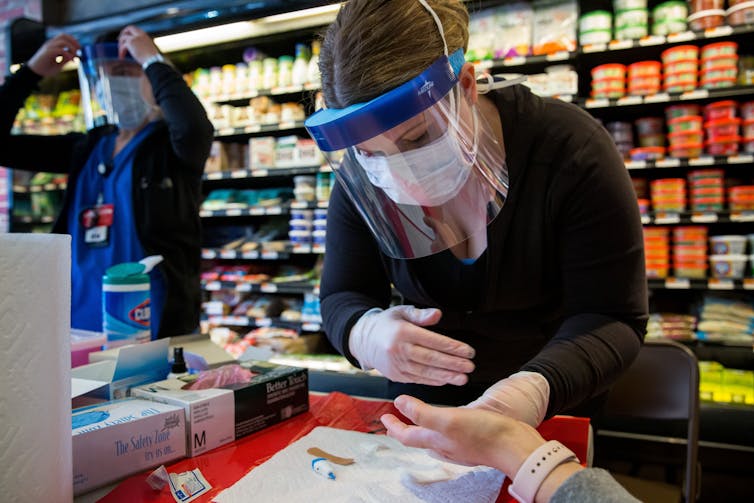Could You Have Coronavirus and Not Know
Claret tests that check for exposure to the coronavirus are starting to come up online, and preliminary findings propose that many people have been infected without knowing it. Even people who do eventually feel the common symptoms of COVID-19 don't outset coughing and spiking fevers the moment they're infected.
William Petri is a professor of medicine and microbiology at the University of Virginia who specializes in infectious diseases. Hither, he runs through what's known and what isn't virtually asymptomatic cases of COVID-19.
How mutual is it for people to contract and fight off viruses without knowing it?
In general, having an infection without whatsoever symptoms is mutual. Perchance the most infamous example was Typhoid Mary, who spread typhoid fever to other people without having any symptoms herself in the early on 1900s.
My colleagues and I have found that many infections are fought off past the body without the person fifty-fifty knowing it. For example, when we carefully followed children for infection by the parasite Cryptosporidia, one of the major causes of diarrhea, almost half of those with infections showed no symptoms at all.
In the example of the flu, estimates are that anywhere from 5% to 25% of infections occur with no symptoms.
For the most part, symptoms are really a side outcome of fighting off an infection. It takes a little time for the immune system to rally that defense, so some cases are more aptly considered presymptomatic rather than asymptomatic.
How can someone spread coronavirus if they aren't coughing and sneezing?
Everyone is on baby-sit against the droplets that spray out from a coronavirus patient'due south cough or sneeze. They're a big reason public health officials have suggested anybody should wear masks.
Simply the virus likewise spreads through normal exhalations that can deport tiny droplets containing the virus. A regular breath may spread the virus several anxiety or more than.
Spread could also come from fomites – surfaces, such as a doorknob or a grocery cart handle, that are contaminated with the coronavirus by an infected person'south touch.
What's known virtually how contagious an asymptomatic person might be?
No matter what, if you've been exposed to someone with COVID-19, yous should self-quarantine for the unabridged 14-day incubation period. Fifty-fifty if you experience fine, you're notwithstanding at risk of spreading the coronavirus to others.
Nearly recently it has been shown that loftier levels of the virus are present in respiratory secretions during the "presymptomatic" menstruum that tin can last days to more than a week prior to the fever and coughing characteristic of COVID-19. This ability of the virus to exist transmitted by people without symptoms is a major reason for the pandemic.

After an asymptomatic infection, would someone still accept antibodies against SARS-CoV-2 in their blood?
Most people are developing antibodies afterwards recovery from COVID-19, probable even those without symptoms. Information technology is a reasonable supposition, from what scientists know nigh other coronaviruses, that those antibodies volition offering some measure of protection from reinfection. Merely zero is known for sure yet.
Recent serosurveys in New York Urban center that check people's claret for antibodies against SARS-CoV-2 indicate that every bit many equally one in five residents may have been previously infected with COVID-19. Their immune systems had fought off the coronavirus, whether they'd known they were infected or not – and many manifestly didn't.
How widespread is asymptomatic COVID-19 infection?
No one knows for certain, and for the moment lots of the evidence is anecdotal.
For a small example, consider the nursing home in Washington where many residents became infected. Twenty-three tested positive. Ten of them were already sick. 10 more somewhen developed symptoms. But 3 people who tested positive never came downwardly with the illness.
When doctors tested 397 people staying at a homeless shelter in Boston, 36% came upwardly positive for COVID-19 – and none of them had complained of any symptoms.
In the case of Japanese citizens evacuated from Wuhan, China and tested for COVID-19, fully 30% of those infected were aymptomatic.
An Italian pre-impress study that has not even so been peer-reviewed constitute that 43% of people who tested positive for COVID-19 showed no symptoms. Of business: The researchers found no divergence in how potentially contagious those with and without symptoms were, based on how much of the virus the examination plant in individuals' samples.
The antibody serosurveys getting underway in different parts of the land add further evidence that a adept number – possibly anywhere from around 10% to 40% – of those infected might non experience symptoms.
Asymptomatic SARS-CoV-2 infection appears to be common – and will continue to complicate efforts to get the pandemic nether control.
[Research into coronavirus and other news from science. Subscribe to The Chat'due south new science newsletter.]
caronfescithavers.blogspot.com
Source: https://theconversation.com/infected-with-the-coronavirus-but-not-showing-symptoms-a-physician-answers-5-questions-about-asymptomatic-covid-19-137029
0 Response to "Could You Have Coronavirus and Not Know"
Post a Comment